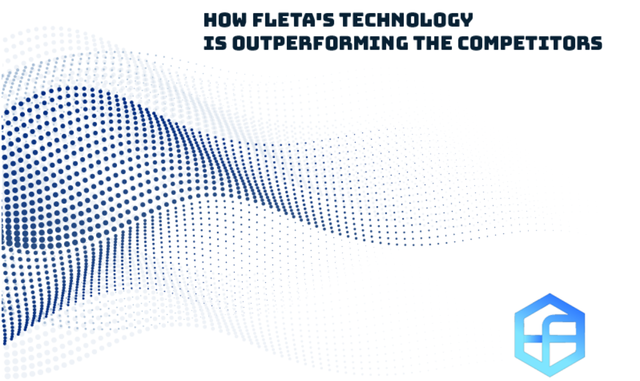How Fleta's Technology is Outperforming the Competitors

How Fleta’s Technology is Outperforming the Competitors
FLETA is a platform and blockchain ecosystem for the creation of revolutionary dApps. The platform mainly focuses on technological advancement and innovation to allow developers to fully focus on their ideas without having to worry about anything else.
The creation of dApp platforms has been increasing dramatically during the last year as dApps are becoming extremely popular. dApps are usually open-source, they operate using a decentralized consensus mechanism which means the nodes are able to connect with each other directly.
Decentralized applications are desperately looking for a way to scale in the future as well as full independence. These crucial features are not currently provided by mainstream networks like Ethereum or others. It is also important to have a reasonable execution fee and speed. All these issues are playing a big role in the adoption problem for dApps.
Clearly, developers and users are really interested in them, however, there are still many unresolved issues that also include volatility and design. It’s important to note that the technology behind decentralized applications is still fairly new and there is still a lot of room for improvement.
FLETA knows the problems dApps are currently facing and it’s trying to solve them one by one. The team of FLETA knows that technological innovation is crucial if dApps ever want to be globally adopted.
Transaction Speed and Network Congestion
Transaction speed is one of the most important factors when it comes to a dApp and cryptocurrencies in general. For instance, the Ethereum network got extremely congested due to the popularity of a dApp called CryptoKitty. Similarly, ICOs that operate on the Ethereum network can also have a huge impact on the network overall.
Ethereum’s transaction speed is also not fast enough at around 15 transactions per second only, in comparison, Visa can process up to 45,000 transactions per second. Clearly, the Ethereum network is not well equipped to hold so many dApps at the same time.
First of all, the FLETA platform has been able to achieve 14,000 transactions per second in laboratory conditions and is aiming to reach 20,000 per second. Considering Visa processes around 2,000 transactions per second on average, FLETA is certainly well equipped to provide a robust infrastructure for any decentralized application.
Scalability of dApps.
FLETA is not only capable of achieving high transaction speeds but also provides dApps with basically infinite scalability. FLETA allows each dApp to operate independently, which means that the network will never be congested because of another dApp like in the Ethereum case.
Each decentralized application holds its own chain on the FLETA platform, this means that the economy of each token can be updated through specific consensus mechanisms picked by the developer.
This scalability is also achieved thanks to FLETA’s parallel sharding which means that each shard is not directly or indirectly influenced by any other shard. This also means that double-spending is simply impossible on FLETA.
A Brand New Consensus Mechanism
While most cryptocurrencies and blockchain-based platforms are opting for traditional consensus mechanisms like PoW or PoS, FLETA has been able to develop a brand new mechanism called PoF (Proof of Formulation)
This new consensus protocol also incentivizes people to confirm and generate blocks by rewarding them using transaction fees, however, thanks to improved features, PoF eliminates unnecessary forks and allows blocks to be generated in a designated order.
FLETA Provides All the Tools to Create and Run a dApp Successfully.
FLETA offers developers a wide variety of tools and resources to create and run their own decentralized applications. For instance, anyone can create a brand new token on the FLETA platform. Additionally, once a token is created, it can be sold through FLETA’s Token Sale System using FLETA coins.
FLETA also offers developers and users a brand new wallet that is available for web and Android. Users can store FLETA coins as well as a wide variety of ERC-20 tokens. Users also have total control over mining functions and can request a new delegation at any time or become a formulator.
FLETA is smart-contract friendly and supports traditional programming languages like Solidity, JavaScript or Go and it’s planning to support even more like Java, SQL, and C++.
Additionally, all of FLETA’s smart contracts have been audited by third-party security firms.
One of the newest tools offered by FLETA is the Gateway System, a system that enables users to swap ERC-20 tokens to mainnet coins. What usually happens is that tokens are launched on top of Ethereum’s blockchain but they eventually transition into their mainnet and the old tokens become unusable. FLETA allows dApps to use their ERC-20 tokens in parallel with FLETA’s chain, this provides developers with a ton of flexibility.
![shutterstock_1572536971 [Dönüştürülmüş].png](https://steemitimages.com/640x0/https://cdn.steemitimages.com/DQmX26PxRYKxKc6xec7TmFD2ZC47vgGF8nyr8Rh94ALBwBr/shutterstock_1572536971%20[D%C3%B6n%C3%BC%C5%9Ft%C3%BCr%C3%BClm%C3%BC%C5%9F].png)
Conclusion
Decentralized applications are clearly becoming popular, and not only among cryptocurrency users. We already have thousands of different dApps and the need for better platforms is definitely increasing. Traditional platforms like Ethereum and others are great, however, they lack the ability to provide scalability which is crucial for the future of dApps.
If we ever want dApps to become mainstream, we need far more scalability and other smaller improvements. FLETA is trying to provide that right now, the team of FLETA is working very hard to provide developers with all the necessary tools to build the best dApps.
great review and it looks like an interesting project. How does Steem compare to Fleta's network, if I may ask? I was hoping to see a comparison. I've used Ethereum a few times and it is somewhat slow
My next article title can be "Fleta vs Steem" if you want :)
To listen to the audio version of this article click on the play image.

Brought to you by @tts. If you find it useful please consider upvoting this reply.